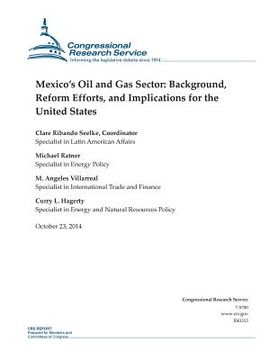Mexico's Oil and Gas Sector: Background, Reform Efforts, and Implications for the United States (en Inglés)
Reseña del libro "Mexico's Oil and Gas Sector: Background, Reform Efforts, and Implications for the United States (en Inglés)"
The future of oil and natural gas production in Mexico is of importance for both Mexico's economic growth, as well as for U.S. energy security, a key congressional interest. Mexico is a top trade partner and crude oil supplier to the United States. Mexico's state oil company, Petroleos Mexicanos (Pemex) remains an important source of government revenue even as it is struggling to counter declining oil production and reserves. Due to an inability to meet rising demand, Mexico has also significantly increased natural gas imports from the United States. Still, gas shortages have hindered the country's economic performance, including in manufacturing sectors that are highly integrated with U.S. industries. On December 20, 2013, Mexican President Enrique Peña Nieto signed historic constitutional reforms related to Mexico's energy sector aimed at reversing oil and gas production declines. On August 11, 2014, secondary laws to implement those reforms officially opened Mexico's oil, natural gas, and power sectors to private investment. As a result, Pemex can now partner with international companies that have the experience and capital required for exploring Mexico's vast deep water and shale resources. Leftist parties and others remain opposed to the reforms, however, maintaining that the reforms cede control over Mexico's natural resources without ensuring that those resources are developed in a sustainable way that benefits the Mexican people. Opponents hope to convene a popular referendum on the reforms during the 2015 mid-term elections, but Mexico's Supreme Court may not allow it to take place. The energy reforms transform Pemex into a "productive state enterprise" with more autonomy and a lower tax burden than before, but make it subject to competition with private investors. They create different types of contracts for private companies interested in investing in Mexico, including production-sharing and licensing; allow companies to post reserves for accounting purposes; establish a sovereign wealth fund; and create new regulators. In August, Mexico's Secretariat of Energy announced the results of "Round Zero," which defines the exploratory and production areas that Pemex can retain. Pemex is likely to partner with private companies to exploit many of those areas. The first round of public bidding is expected in 2015. The U.S. Congress has legislative and oversight interests in examining the potential implications of Mexico's oil and natural gas reforms on U.S. hydrocarbons imports and exports, bilateral trade and investment, and economic conditions in Mexico. Congress approved the U.S.-Mexico Transboundary Hydrocarbons Agreement in December 2013 (P.L. 113-67, the Bipartisan Budget Act of 2013). That agreement is intended to facilitate joint development of oil and natural gas in part of the Gulf of Mexico. In June 2014 and again in September 2014, the House approved measures (H.R. 3301/H.R. 2) with provisions to ensure the continued development of infrastructure to export natural gas to Mexico. The opening of Mexico's oil and natural gas sector could expand U.S.-Mexico energy trade and provide opportunities for U.S. companies involved in the hydrocarbons sector, as well as infrastructure and other oil field services. If these reforms accelerate growth and investment in Mexico (as the government has stated) they could also benefit North American competitiveness. Industry analysts maintain that the reforms are generally well-designed, but that the way they are implemented will likely determine whether they prove to be as transformative as the Mexican government expects.

